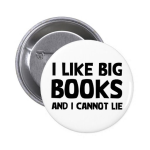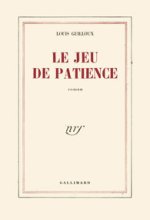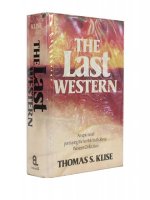Stevie B
Current Member

I have a button, similar to the one above, pinned to my office bulletin board, but the truth is that I have a tendency to delay reading larger books. I think about all of the unread books I own, and I figure why read one book when, during the same amount of time, I could finish two or three others. I also realize, however, that longer books have often provided more satisfying reading experiences, so one of my goals for the coming year is to tackle some of those larger books (600 pages or more) that have been gathering dust on my bookshelves. I'm curious to know what are several bigger books you've especially enjoyed, and what are a few you're looking forward to reading in the near future. Here are a few titles that make my lists:
Big Books I've Enjoyed
Ken Kesey: Sometimes a Great Notion
Leo Tolstoy: Anna Karenina
Wallace Stagner: The Big Rock Candy Mountain
Big Book Queue
Halldor Laxness: World Light
Hugo Claus: The Sorrow of Belgium
Robert Tressell: The Ragged Trousered Philanthropists
Last edited:


